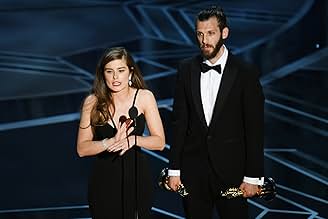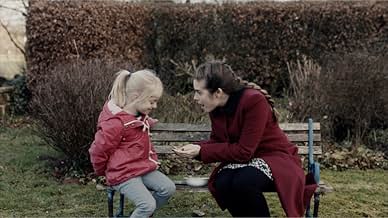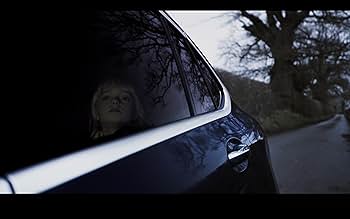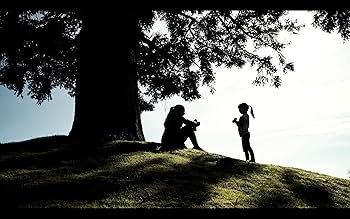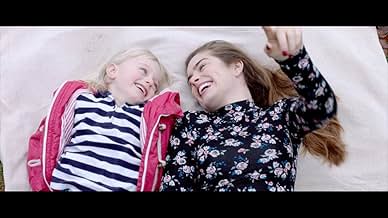CALIFICACIÓN DE IMDb
7.7/10
3.1 k
TU CALIFICACIÓN
Agrega una trama en tu idiomaA deaf 6-year-old girl named Libby lives in a world of silence until a caring social worker teaches her to use sign language to communicate.A deaf 6-year-old girl named Libby lives in a world of silence until a caring social worker teaches her to use sign language to communicate.A deaf 6-year-old girl named Libby lives in a world of silence until a caring social worker teaches her to use sign language to communicate.
- Ganó 1 premio Óscar
- 25 premios ganados y 8 nominaciones en total
- Dirección
- Guionista
- Todo el elenco y el equipo
- Producción, taquilla y más en IMDbPro
Opiniones destacadas
What a wonderfully made and beautiful movie. I am a 38 year old male reduced to tears within minutes. Well done on bringing awareness in such a beautiful way. Can't stop thinking about the movie.
The mother was deaf in ways of her own, wasn't she? A touching story, beautiful cinematography, and a lovely pair of actors in the social worker and deaf child (Rachel Shenton and Maisie Sly), make this a good short, even if it is a little heavy-handed.
'THE SILENT CHILD': Four Stars (Out of Five)
A 20-minute short film about a four-year-old deaf girl, who's assigned a social worker to help her learn sign language, but her skeptical parents are highly resistant to it. This short was directed by Chris Overton and written by Rachel Senton. It's well made, but it's also quite depressing and frustrating at times too. The film deals with some annoyingly bigoted parents, that you learn to really dislike throughout the short (or at least I did). I also learned to really care for the young deaf girl though. It's well made and insightful too.
A 20-minute short film about a four-year-old deaf girl, who's assigned a social worker to help her learn sign language, but her skeptical parents are highly resistant to it. This short was directed by Chris Overton and written by Rachel Senton. It's well made, but it's also quite depressing and frustrating at times too. The film deals with some annoyingly bigoted parents, that you learn to really dislike throughout the short (or at least I did). I also learned to really care for the young deaf girl though. It's well made and insightful too.
I must admit up front that I am not at all impartial in my ability to review "The Silent Child". Because I am the parent of a deaf daughter and am very acquainted with the subject matter in the film, the picture had a HUGE impact on me and I found myself crying during portions of the short. Even if perhaps I am not 100% impartial, the film earned a nomination for Best Live Action Short from the Oscars and I am rooting for it to take home the statuette--because of the quality of the film and because its message needs to be spread far and wide.
The story is about a cute little girl named Libby who lives in England. Her family is very well off and Libby is about to begin school. However, there is a problem...Libby is profoundly deaf. Because of this, a social worker has been assigned to work with the child. Soon it becomes apparent that the family (the mother in particular) want some miracle to occur...for Libby to hear and talk, though this just is very very unlikely. Plus, with the family refusing to learn sign language and just hoping all works out, things look pretty bad for Libby...even after she begins to blossom and open up during the time she works with the social worker.
The themes of this short are how woefully inadequate the school systems are to handle the needs of a deaf child and well as how woefully inadequate many parents of deaf kids are to be parents. Everything I saw in the film seemed familiar to me...such as the fact that the vast majority of deaf kids have parents who never learn to communicate with them and how isolated deaf children can be. While the problem in the US is not quite as severe as it is in the UK (here we have generally had little difficulty getting interpreters and other assistance with our daughter due to her disability), it still hits quite close to home. And, like Libby's family, I've known families who simply refuse to do anything to admit that their child needs remediation.
Overall, extremely well made, insightful and sad in many, many ways.
The story is about a cute little girl named Libby who lives in England. Her family is very well off and Libby is about to begin school. However, there is a problem...Libby is profoundly deaf. Because of this, a social worker has been assigned to work with the child. Soon it becomes apparent that the family (the mother in particular) want some miracle to occur...for Libby to hear and talk, though this just is very very unlikely. Plus, with the family refusing to learn sign language and just hoping all works out, things look pretty bad for Libby...even after she begins to blossom and open up during the time she works with the social worker.
The themes of this short are how woefully inadequate the school systems are to handle the needs of a deaf child and well as how woefully inadequate many parents of deaf kids are to be parents. Everything I saw in the film seemed familiar to me...such as the fact that the vast majority of deaf kids have parents who never learn to communicate with them and how isolated deaf children can be. While the problem in the US is not quite as severe as it is in the UK (here we have generally had little difficulty getting interpreters and other assistance with our daughter due to her disability), it still hits quite close to home. And, like Libby's family, I've known families who simply refuse to do anything to admit that their child needs remediation.
Overall, extremely well made, insightful and sad in many, many ways.
Greetings again from the darkness. Few things are more disheartening and frustrating than seeing a child neglected by their parents. When that child is deaf or hearing-impaired, the actions of such parents cross over to infuriating. Such is the topic of this gut-wrenching short film from writer Rachel Shenton and director Chris Overton.
While we usually assume parents are focused on the best interests of the child, this expertly crafted film shows us just how easy it is for everyday life to impact our best intentions. Four year old Libby (Maisie Sly) is the youngest child in a typically busy home. Work, school and activities keep the others swarming around her - leaving young Libby in an isolated state of confusion. Libby is profoundly deaf, unable to communicate with her family, and rarely even interacts. Her mother (played by Rachel Fielding) is the on-the-go type who wants her daughter to be normal, and absent-mindedly yells "Bye Libby" as she heads out for her next errand.
When social worker/tutor Joanne (writer Shenton) is hired to prepare Libby for school, it isn't long before the two are conversing through sign-language and young Libby comes alive ... playing in the park and asking for orange juice. It's a beautiful thing to watch unfold.
Early on, the film addresses that Libby "does not qualify" for a cochlear implant, which apparently was the last bit of effort her mother expended in trying to make her "normal". The film is beautifully shot and carries the strong message that with a bit of support, deaf children can be mainstreamed into schools - though I do wish some more attention had been given to cochlear implants. Ending with a couple of sobering statistics, it's refreshing to know that Ms. Shenton is an activist supporting the deaf community.
While we usually assume parents are focused on the best interests of the child, this expertly crafted film shows us just how easy it is for everyday life to impact our best intentions. Four year old Libby (Maisie Sly) is the youngest child in a typically busy home. Work, school and activities keep the others swarming around her - leaving young Libby in an isolated state of confusion. Libby is profoundly deaf, unable to communicate with her family, and rarely even interacts. Her mother (played by Rachel Fielding) is the on-the-go type who wants her daughter to be normal, and absent-mindedly yells "Bye Libby" as she heads out for her next errand.
When social worker/tutor Joanne (writer Shenton) is hired to prepare Libby for school, it isn't long before the two are conversing through sign-language and young Libby comes alive ... playing in the park and asking for orange juice. It's a beautiful thing to watch unfold.
Early on, the film addresses that Libby "does not qualify" for a cochlear implant, which apparently was the last bit of effort her mother expended in trying to make her "normal". The film is beautifully shot and carries the strong message that with a bit of support, deaf children can be mainstreamed into schools - though I do wish some more attention had been given to cochlear implants. Ending with a couple of sobering statistics, it's refreshing to know that Ms. Shenton is an activist supporting the deaf community.
¿Sabías que…?
- TriviaRachael Shenton signed along with her Academy Award acceptance speech (using British Sign Language BSL) after making a promise to her co-star Maisie Sly, that she would do so if they won.
- ConexionesFeatured in The Oscar Nominated Short Films 2018: Live Action (2018)
Selecciones populares
Inicia sesión para calificar y agrega a la lista de videos para obtener recomendaciones personalizadas
Detalles
- Fecha de lanzamiento
- País de origen
- Sitios oficiales
- Idiomas
- También se conoce como
- La niña silenciosa
- Locaciones de filmación
- Productoras
- Ver más créditos de la compañía en IMDbPro
Taquilla
- Presupuesto
- GBP 10,000 (estimado)
- Tiempo de ejecución20 minutos
- Color
- Relación de aspecto
- 2.35 : 1
Contribuir a esta página
Sugiere una edición o agrega el contenido que falta

Principales brechas de datos
By what name was The Silent Child (2017) officially released in Canada in English?
Responda
